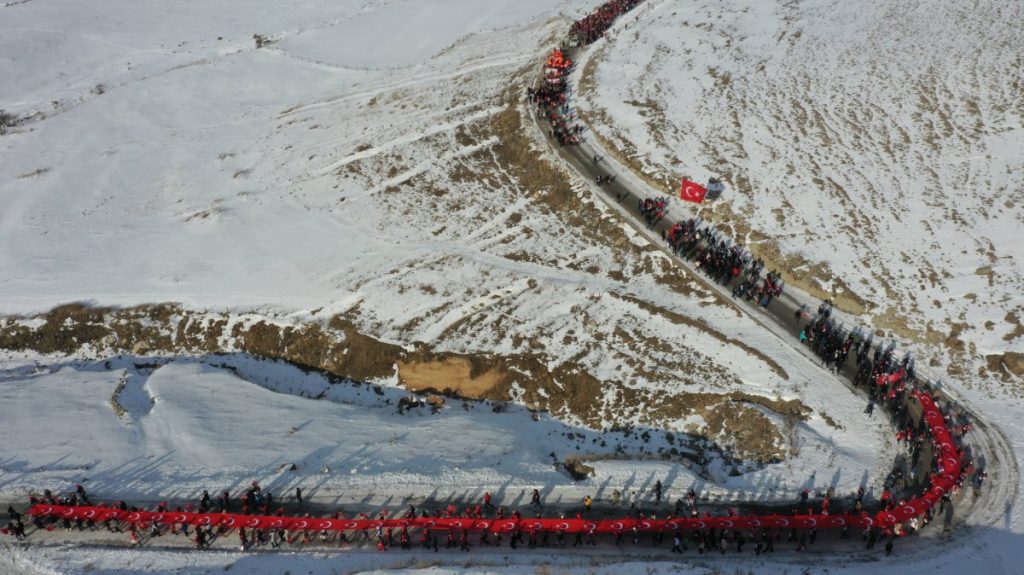Kars, in the northeastern part of Türkiye near the Armenian border, hosted the 110th-anniversary events of the Sarıkamış Operation in its Sarıkamış district. Thousands of people participated in a torch-lit procession to commemorate the operation.
Those attending the Mevlid (prayer) held at Kazım Karabekir Paşa Mosque for the soldiers lost during the campaign gathered at Sarıkamış July 15 Democracy Square with Turkish flags and torches.
On the platform set up in the square, the Izmir Cold Sculpture Workshop staged the play “Cold Sculptures,” directed by Hüseyin Özer.
Sand artist Ömer Faruk Elmas performed a show using sand to depict the Sarıkamış soldiers.
After the play, which focused on some of the events of the Sarıkamış Operation, Youth and Sports Minister Osman Aşkın Bak, Family and Social Services Minister Mahinur Özdemir Göktaş, Republican People’s Party (CHP) Chair Özgür Özel, Governor Ziya Polat, Justice and Development Party (AK Party) Kars deputy Adem Çalkın, Sarıkamış District Governor Enis Aslantatar, Sarıkamış Mayor Serdar Kılıç and thousands of people began a torch-lit procession.
Despite the temperature of minus 15 degrees Celsius (5 degrees Fahrenheit), participants marched about 3 kilometers to the Upper Sarıkamış Martyrs’ Cemetery, chanting Takbirs (Islamic expressions of praise for God).
At the cemetery, the Quran was recited for those lost in the campaign, prayers were said and the words “Ruhun Şad Olsun” (Rest in Peace) were set alight with torches.
In addition to military units, volunteers from the Red Crescent and many civil society organizations from various cities participated in the procession.
Red Crescent volunteers served hot soup and tea to the attendees.
Fikriye Kaynak, one of the participants, said that they commemorated all martyrs with mercy and said: “I am a true supporter of Sarıkamış. I feel the procession in my soul. Some friends say, ‘You are old; you can’t walk.’ But if people come to Kars from Izmir, Edirne, why shouldn’t we walk? I felt as cold as they did. We live freely because of them. May God have mercy on them.”
Büşra Güney expressed that the cold weather didn’t stop them, saying: “It’s really worth it for them. We will defend this place no matter how cold it gets; we will walk.”
Esmer Aydan Ayboğan also mentioned how cold it was during the walk, saying: “I could feel the hardship they went through. We are sad; we feel their emotions.”
The Sarıkamış offensive was launched to repel the advance of Russian forces upon the Ottoman Empire’s eastern borders during World War I. The offensive, which began in December 1914, quickly succumbed to the weather, with scores of troops lost in blizzards.
After suffering tragic losses, only a few Ottoman units reached Sarıkamış, which was under Russian occupation. Records from the Turkish Armed Forces (TSK) show some 60,000 soldiers died from cold, hunger and hypothermia because they weren’t wearing suitable uniforms.
Despite the Ottoman defeat, the Russian command was alarmed enough to call for help from its allies, who subsequently initiated the famous Gallipoli campaign, where Ottoman forces emerged victorious.
The Gallipoli campaign paved the way for the Turkish War of Independence under the command of Mustafa Kemal Atatürk, the commander at the Battle of Gallipoli, who later founded the Republic of Türkiye.


